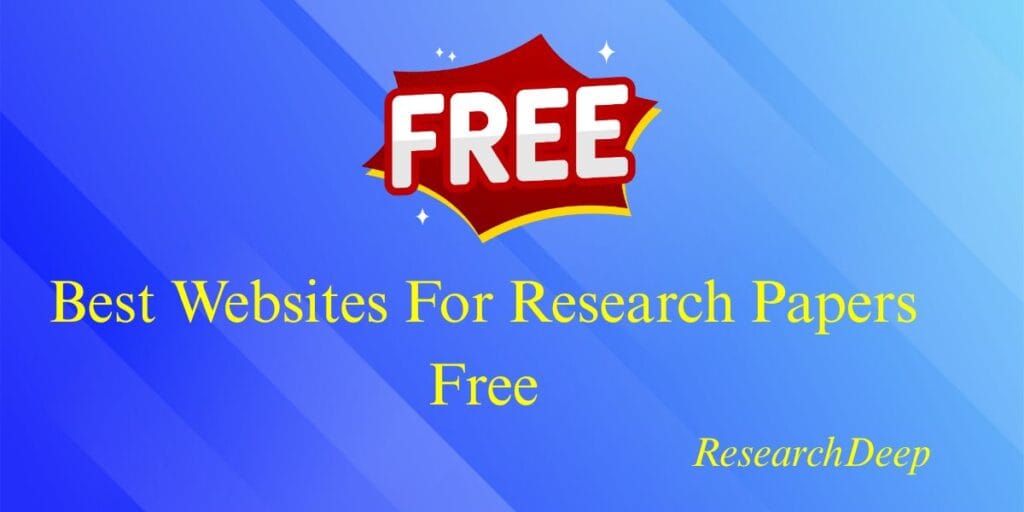Last updated on November 25th, 2025 at 01:28 pm
Academic databases and search engines are giant libraries filled with the best scholarly articles and journals, all organized for easy searching!
This guide introduces you to the 17 best academic databases and search engines making your research a breeze. No more getting lost – these databases will help you find exactly what you need to write a fantastic research paper a PhD Thesis, a lengthy doctoral dissertation, a literature review, or a systematic literature review.
Table of Contents
The 17 Best Academic Databases And Search Engines
Here’s a helpful tip before you begin searching for relevant sources: identify a few keywords that closely match or are most relevant to your field of study [the more the better, else, it will be like finding a needle in a haystack!] Once done, go through the databases and search engines listed below employing the keywords.
1. Google Scholar
Google Scholar is among the most popular free and widely used academic search engines. It covers almost 80-90% of all published papers in various disciplines and topics and allows you to customize the results by year, author, journal, citation count, and more. Besides, most papers, books articles, etc. found in the above database are indexed by it.
You can access the full text of numerous papers in PDF format or find links to other sources from where they can be accessed. By mastering Google Scholar, you can find relevant research papers with their respective citations that can be included in the Bibliography or References section.
Capitalizing on this powerful search engine can be a daunting task. It will help to negotiate it well to maximize your results.
2. EBSCO
Also known as Academic Search Premier, this provides one of the largest platforms for exposure to Open Access [OA] Journal databases with a collection of 6136 active OA journals from around the world.
Ebsco also validates and certifies journals that can be included in the OA category with their superior indexing and sophisticated, precise full-text linking ability.
3. Web of Science
WOS is a comprehensive and authoritative academic database. It covers over 20,000 journals and books across various fields of science, social sciences, arts, and humanities. It also provides citation information and analytic tools that can help you measure the impact and quality of your sources. You can also create alerts and save your searches for future reference.
4. Elsevier
This is one of the most reputed and largest publishers of scholarly journals and books. It provides access to over 25 million research articles and a reliable source of reference material.
Additionally, its online portal also offers access to books, databases, and useful resources that can enhance search potential.
5. Scopus
A well-known name in Academia, Scopus is a large and reputable source for sourcing academic papers. It covers over 25,000 journals and books across various fields of science, technology, medicine, social sciences, arts and humanities.
It also provides citation information and analysis tools that help you evaluate your sources and find related papers. You can also create alerts and save your searches for future reference.
6. ScienceDirect
This is an online database of Scientific, Technical, Medical, Physical Sciences and Engineering, Life Sciences, Health Sciences, Social Sciences, and Humanities.
This database offers more than 3,500 peer-reviewed scientific journals emphasizing research studies in the sciences, engineering, and medical databases.
Incidentally, both, Scopus and ScienceDirect are subsidiaries of Elsevier.
7. PubMed
PubMed is a specialized source for finding biomedical and health-related papers. It covers over 30 million citations from various sources such as journals, books, conference proceedings, patents, and more.
It also provides links to full-text articles and other resources for easier accessibility. You can also use advanced search options and filters to refine your results.
8. JSTOR
This contains a database of more than 12 million journal articles, books, images, and primary sources in 75 disciplines. It offers easy accessibility to a wide range of scholarly research papers by engaging with its powerful research and teaching platform.
It ensures that academic communities, libraries, and students can connect easily. Also, some independent researchers are offered free or low-cost scholarships and facilitate publishers to reach wider audiences besides storing their content for future generations to access.
9. ProQuest
ProQuest is an online academic database that offers access to over 10 million scholarly journals, books, videos and audio, dissertations, theses, and other research materials.
It is a leading educational/technical organization that provides a comprehensive academic database and is a great resource for finding academic and other research information and papers on most topics.
10. arXiv
arXiv concentrates on providing journals and conferences in various fields related to mathematics, physics, statistics, computer science biology, and engineering, among others.
It also provides a preprint server where researchers can upload their papers before publishing them. This allows access to the latest research studies in your domain before it is peer-reviewed or published elsewhere.
However, caution is the watchword here, as some sources may not be accurate or reliable and may need further authentication.
11. Microsoft Academic
This incorporates semantic analysis and relies on artificial intelligence to extract information from papers across various disciplines and topics to create a knowledge graph of academic concepts.
It also provides citation information and analysis tools that can help discover new insights and connections in your research.
This approach provides accurate and structured data about each paper, such as authors, affiliations, citations, references, topics, fields of study, etc.
12. ERIC
Eric is a search engine that focuses on bibliographic records including abstracts, citations, and other relevant data on education-related papers from various sources such as journals, books, reports, dissertations, and more.
Eric also provides links to full-text articles and other resources that provide easy accessibility.
13. PsycINFO
PsycINFO is a search engine that provides authoritative behavioral and social science research. It essentially specializes in psychology-related papers from various sources such as journals, books, dissertations, reviews, and more.
It also provides links to full-text articles and other resources for easy access.
14. Google Books
Google Books is a Google service that searches through books and periodicals that have been scanned, optical character recognition (OCR) converted to text, and saved in Google’s digital database in their entirety.
It is a huge online database of e-books and published text content from around the world. There are both classic and contemporary literature and research materials and can be a great source for any paper.
The important feature of Google Books is its ability to locate relevant content within the books. This can be a useful asset that allows readers to quickly and easily find relevant information they may need for their specific area of research study.
15. The National Library of Medicine
(NLM) is a comprehensive online biomedical database of medical journals, and clinical trials that may have been conducted anywhere in the world.
Besides, it provides access to a wide range of databases on health-related content and can be an invaluable source of material for medical research projects.
16. World Cat
This is an online worldwide catalog of libraries, that contains a database of 30 million dissertations and theses, 440 million articles, 405 million books, 25 million sound recordings, 10 million musical scores, and 6 million maps.
In a nutshell, it is almost a one-stop shop for all your academic needs. Many researchers believe that it is possible to find nearly anything on World Cat.
17. Credo Reference
Credo is an extensive digital repository that offers users the opportunity to access the complete text of numerous esteemed and widely recognized publications. Credo effectively enhances the presentation of information by using visual aids such as photos, music files, animations, and other multimedia elements.
You can discover uncomplicated solutions and authoritative, comprehensive articles. Besides, Credo Reference encompasses a comprehensive collection of bilingual dictionaries, thesauri, encyclopedias, quotations, and atlases.
Its database contains over 3 million full-text articles from more than 2000 varied sources and can be an asset if you are writing a thesis in these disciplines.
Additionally, it offers a diverse array of subject-specific titles that span a wide range of fields, including accounting, zoology, maps, mathematics, management, martial arts, media studies, medicine, mountains, moons, music, multimedia, and mythology.
Related Reads
9 Best Research Paper Search Engines
Where To Read Research Papers For Free
Best Websites For Research: Type-Specific Guide
FAQ’S
Why do we use academic databases?
Libraries offer substantial benefits in terms of authority, accuracy, and accessibility. The authority of library databases lies in their inclusion of works sourced from professionally published publications, which enhances the likelihood of obtaining information from experts in a specific field.
Is a database an academic source?
Certain databases encompass intellectual information, such as academic journals on a particular topic matter, while others comprise stories sourced from widely circulated magazines like Newsweek or Forbes. Databases often comprise a blend of information derived from both academic and mainstream sources.
What are the objectives of a database?
The goal of implementing a database is the capacity to consolidate, synchronize, and merge the gathering and retention of data. This phenomenon can lead to enhanced uniformity, diminished duplication, and decreased exertion in the acquisition and upkeep of data.
Conclusion
To sum up, when dealing with academic databases, tread with caution and investigate the relevant specifications recommended by your university or supervisor before you begin. Also, over and above the 16 databases listed above, consider Google Scoholar as well.
Importantly, most of the databases and search engines described above, permit you to readily export your search results to another personal database or reference managers such as Mendeley, EndNote, or Zotero for storage and future reviewing, in-text citations and references that are invaluable for composing research papers.




